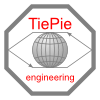/**
* OscilloscopeStream.c
*
* This example performs a stream mode measurement and writes the data to OscilloscopeStream.csv.
*
* Find more information on http://www.tiepie.com/LibTiePie .
*/
#include <stdlib.h>
#include <stdio.h>
#include <inttypes.h>
#include <libtiepie.h>
#include "CheckStatus.h"
#include "PrintInfo.h"
#include "Utils.h"
int main(int argc, char* argv[])
{
int status = EXIT_SUCCESS;
// Initialize library:
LibInit();
// Print library information:
printLibraryInfo();
// Enable network search:
NetSetAutoDetectEnabled(BOOL8_TRUE);
CHECK_LAST_STATUS();
// Update device list:
LstUpdate();
CHECK_LAST_STATUS();
// Try to open an oscilloscope with with stream measurement support:
LibTiePieHandle_t scp = LIBTIEPIE_HANDLE_INVALID;
for(uint32_t index = 0; index < LstGetCount(); index++)
{
if(LstDevCanOpen(IDKIND_INDEX, index, DEVICETYPE_OSCILLOSCOPE))
{
scp = LstOpenOscilloscope(IDKIND_INDEX, index);
CHECK_LAST_STATUS();
// Check for valid handle and stream measurement support:
if(scp != LIBTIEPIE_HANDLE_INVALID && (ScpGetMeasureModes(scp) & MM_STREAM))
{
break;
}
else
{
scp = LIBTIEPIE_HANDLE_INVALID;
}
}
}
if(scp != LIBTIEPIE_HANDLE_INVALID)
{
// Get the number of channels:
const uint16_t channelCount = ScpGetChannelCount(scp);
// Set measure mode:
ScpSetMeasureMode(scp, MM_STREAM);
// Set sample frequency:
ScpSetSampleFrequency(scp, 1e3); // 1 kHz
// Set record length:
const uint64_t recordLength = ScpSetRecordLength(scp, 1000); // 1 kS
// For all channels:
for(uint16_t ch = 0; ch < channelCount; ch++)
{
// Enable channel to measure it:
ScpChSetEnabled(scp, ch, BOOL8_TRUE);
CHECK_LAST_STATUS();
// Set range:
ScpChSetRange(scp, ch, 8); // 8 V
CHECK_LAST_STATUS();
// Set coupling:
ScpChSetCoupling(scp, ch, CK_DCV); // DC Volt
CHECK_LAST_STATUS();
}
// Print oscilloscope info:
printDeviceInfo(scp);
// Create data buffers:
float** channelData = malloc(sizeof(float*) * channelCount);
for(uint16_t ch = 0; ch < channelCount; ch++)
{
channelData[ch] = malloc(sizeof(float) * recordLength);
}
// Open file with write/update permissions:
const char* filename = "OscilloscopeStream.csv";
FILE* csv = fopen(filename, "w");
if(csv)
{
// Start measurement:
ScpStart(scp);
// Write csv header:
fprintf(csv, "Sample");
for(uint16_t ch = 0; ch < channelCount; ch++)
{
fprintf(csv, ";Ch%" PRIu16, (ch + 1));
}
fprintf(csv, NEWLINE);
uint64_t currentSample = 0;
for(uint8_t chunk = 0; chunk < 10; chunk++) // Measure 10 chunks
{
// Print a message, to inform the user that we still do something:
printf("Data chunk %" PRIu8 NEWLINE, chunk + 1);
// Wait for measurement to complete:
while(!(ScpIsDataReady(scp) || ScpIsDataOverflow(scp) || ObjIsRemoved(scp)))
{
sleepMiliSeconds(10); // 10 ms delay, to save CPU time.
}
// Print error on device remove:
if(ObjIsRemoved(scp))
{
fprintf(stderr, "Device gone!" NEWLINE);
status = EXIT_FAILURE;
break;
}
// Print error on data overflow:
if(ScpIsDataOverflow(scp))
{
fprintf(stderr, "Data overflow!" NEWLINE);
status = EXIT_FAILURE;
break;
}
// Get data:
uint64_t samplesRead = ScpGetData(scp, channelData, channelCount, 0, recordLength);
// Write the data to csv:
for(uint64_t i = 0; i < recordLength; i++)
{
fprintf(csv, "%" PRIu64, currentSample + i);
for(uint16_t ch = 0; ch < channelCount; ch++)
{
fprintf(csv, ";%f", channelData[ch][i]);
}
fprintf(csv, NEWLINE);
}
currentSample += samplesRead;
}
printf("Data written to: %s" NEWLINE, filename);
// Close file:
fclose(csv);
// Stop measurement:
ScpStop(scp);
}
else
{
fprintf(stderr, "Couldn't open file: %s" NEWLINE, filename);
status = EXIT_FAILURE;
}
// Delete data buffers:
for(uint16_t ch = 0; ch < channelCount; ch++)
free(channelData[ch]);
free(channelData);
// Close oscilloscope:
ObjClose(scp);
CHECK_LAST_STATUS();
}
else
{
fprintf(stderr, "No oscilloscope available with stream measurement support!" NEWLINE);
status = EXIT_FAILURE;
}
// Exit library:
LibExit();
return status;
}
